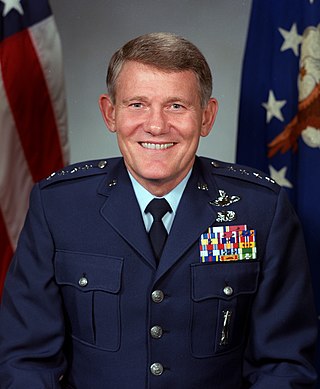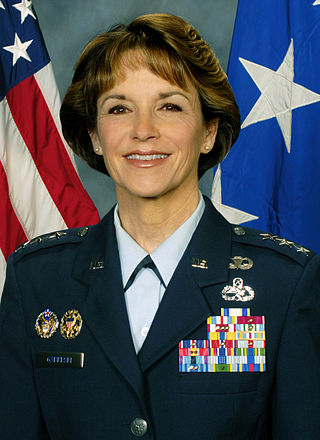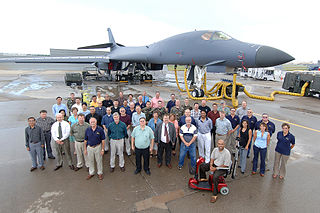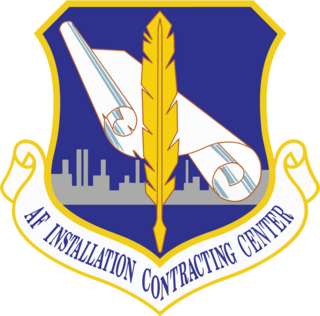
Kirtland Air Force Base is a United States Air Force base. It is located in the southeast quadrant of the Albuquerque, New Mexico, urban area, adjacent to the Albuquerque International Sunport. The base was named for the early Army aviator Col. Roy C. Kirtland. The military and the international airport share the same runways, making ABQ a joint civil-military airport.

Hanscom Air Force Base (AFB) is a United States Air Force base located predominantly within Bedford, Massachusetts, with portions extending into the adjoining towns of Lincoln, Concord and Lexington. The facility is adjacent to Hanscom Field which provides general aviation and charter service.

The Air Education and Training Command (AETC) is one of the nine Major Commands (MAJCOM) of the United States Air Force (USAF), reporting to Headquarters, United States Air Force. It was established 1 July 1993, with the realignment of Air Training Command and Air University.

The Electronic Systems Center was a product center of Air Force Materiel Command (AFMC) headquartered at Hanscom Air Force Base, Massachusetts. Its mission was to develop and acquire command and control, communications, computer, and intelligence systems. ESC consisted of professional teams specializing in engineering, computer science, and business management. The teams supervised the design, development, testing, production, and deployment of command and control systems. Two of ESC's most well-known developments were the Boeing E-3 Sentry Airborne Warning and Control System (AWACS), developed in the 1970s, and the Joint Surveillance Target Attack Radar System, developed in the 1980s.

The 4950th Test Wing, a wing of the United States Air Force, was established in March 1971.

The Air Force Nuclear Weapons Center (AFNWC) is a USAF Named Unit, assigned to the Air Force Materiel Command at Kirtland Air Force Base, New Mexico. The AFNWC operates at the Center level of the AFMC. It is currently under the command of Major General John P. Newberry.

The United States Air Force's 88th Air Base Wing is a base support unit located at Wright-Patterson Air Force Base, Ohio. The wing has been stationed at Wright-Patterson, known familiarly as 'Wright-Patt', since its activation in 1944 as the 4000th Army Air Forces Base Unit (Command) in 1944, and from 1944 to 1994 undergone six redesignations.

General Ronald Wilburn Yates served as Commander, Air Force Materiel Command, Wright-Patterson Air Force Base, Ohio. As AFMC Commander, Yates was responsible for research, development, test, acquisition and logistics support for the Air Force from 18 specialized centers and 116,000 military and civilian employees around the world.

The 311th Human Systems Wing is an inactive wing of the United States Air Force. It was stationed at Brooks City-Base in San Antonio, Texas.

Terry Lee Gabreski is a retired senior officer of the United States Air Force (USAF). She was the second woman to hold the rank of lieutenant general in the USAF. She was the Vice Commander, Air Force Materiel Command, Wright-Patterson Air Force Base, Ohio, which conducts research, development, test and evaluation, and provides acquisition management and logistics support necessary to keep Air Force weapon systems ready for war. She is the daughter of retired Air Force Brigadier General Alonzo Walter and the daughter-in-law of World War II and Korean War fighter ace Colonel Gabby Gabreski.

The 327th Aircraft Sustainment Wing is an inactive wing of the United States Air Force last based at Tinker Air Force Base, Oklahoma. It was last assigned to Air Force Materiel Command's Oklahoma City Air Logistics Center.

Janet Carol Wolfenbarger is a retired United States Air Force four-star general who served as the eighth commander of Air Force Materiel Command from June 5, 2012, to June 8, 2015. She was the first woman to achieve the rank of four-star general in the Air Force. Wolfenbarger retired from the Air Force after over 35 years of service.

Lieutenant General Clyde Dewey Moore II is a retired United States Air Force officer who served as Commander, Air Force Life Cycle Management Center, Wright-Patterson Air Force Base, Ohio. The organization is the single center responsible for total life cycle management covering all aircraft, engines, munitions, and electronic systems.

Patricia Rose is a retired United States Air Force major general.

Arnold Webster Bunch Jr. is a retired United States Air Force four-star general. He last served as the commander of Air Force Materiel Command, headquartered at Wright-Patterson Air Force Base, Ohio. He is responsible for installation and mission support, discovery and development, test and evaluation, life cycle management services and sustainment of virtually every major Air Force weapon system. The command employs approximately 80,000 people and manages $60 billion of budget authority annually. Before his current assignment, he was the military deputy in the Office of the Assistant Secretary of the Air Force for Acquisition at The Pentagon.

Donna D. Shipton is a United States Air Force lieutenant general who serves as commander of the Air Force Life Cycle Management Center. The center is responsible for total life cycle management for aircraft, engines, munitions, electronic, computer, network, cyber and agile combat support systems. The center employs more than 28,000 people and has a budget of over $300 billion. Previously she served as military deputy to the Assistant Secretary of the Air Force for Acquisition, Technology and Logistics.

John Ferdinand "JT" Thompson is a retired lieutenant general in the United States Air Force who last served as the commander of the Space and Missile Systems Center from May 2017 to July 2021. He entered the United States Air Force in 1984 as a graduate of the United States Air Force Academy.

Maureen G. Banavige is a United States Air Force officer who served as the mobilization assistant to the Commander, Air Force Reserve Command from August 2022 to May 2024. She served as the mobilization assistant to the Commander, Air Force Materiel Command from February 2019 to August 2022. Before this assignment, she served as the mobilization assistant to the Commander, Air Force Sustainment Center from August 2018 to February 2019.

The Air Force Installation Contracting Center (AFICC), located at Wright-Patterson Air Force Base, Ohio, is a primary subordinate unit assigned to the Air Force Installation and Mission Support Center, which is one of six centers aligned under Air Force Materiel Command for the United States Air Force. The AFICC is responsible for managing and executing above-wing level operational acquisition across the Department of the Air Force enterprise. Their ten focus areas for enterprise contracting are: information technology, professional services, security & protection, facilities & construction, industrial products & services, office management, transportation & logistics services, travel & lodging, and medical.

David A. Flosi is the 20th chief master sergeant of the Air Force.




































